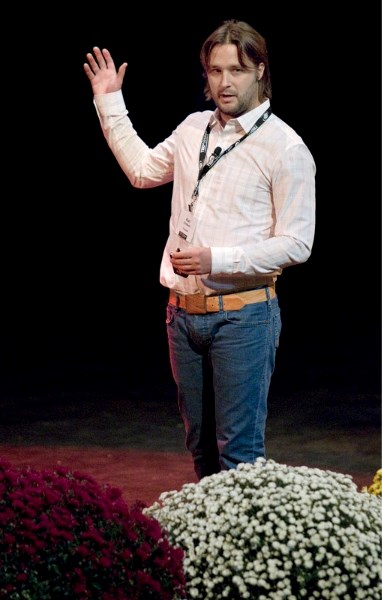St. Albert residents heard from some of the capital region's brightest minds this week about how they could change the world with crap, carrots and water bottles.
About 60 students, teachers, artists, business owners and politicians gathered at the Arden Theatre Wednesday for St. Albert's first annual TEDx conference. A spinoff of the international Technology, Entertainment, Design (TED) conference, TEDx was meant to give creative minds a forum in which to spread their good ideas.
St. Albert needs to find innovative ways to run itself in the future, said attendee Mayor Nolan Crouse, and events like this are just the thing to squeeze out those creative juices.
"We have to have more creative thinking in terms of what the future looks like," he said.
Crap power
The event consisted of a series of 10 to 15-minute talks and video presentations interspersed with performances, such as a live painting by St. Albert artist Lewis Lavoie.
Bio-energy mogul Evan Chrapko started the day by talking about the power of waste — or crap, as he called it. Chrapko is the co-CEO of Highmark Renewables, an Alberta company famous for turning manure into energy.
Crap is cool, Chrapko said — it's a cheap, plentiful energy source that's produced right where we need it (i.e. wherever there are consumers). Yet because it stinks, it has been ignored in favour of fossil fuels and exotic renewables like wind and solar.
He recalled a woman he had once seen overseas who was clutching her sick child outside a hospital. The hospital was closed, as it did not have the electricity needed to run.
"The punch-line? You look 180 degrees away and there's waste everywhere," he said.
It's unconscionable for people to be dying due to a lack of sustainable renewable energy, Chrapko said.
Saying, "the wastage of waste is leading to unnecessary human suffering" he urged the audience to reduce the amount of waste they make and to help developing nations turn their waste into energy.
Bottle power
Social entrepreneur Kori Chilibeck demonstrated how water bottles could feed the poor. Chilibeck is the founder of Earth Water, a company that sells bottled water and donates its profits to the World Food Programme.
Every six seconds, Chilibeck said, a person dies from lack of food or clean water, adding, "180 people died just while I'm here talking today. That's almost twice the number of people sitting in this room."
Chilibeck recalled meeting an old, shoeless man on a rocky path near Mount Everest years ago who was carrying a huge load on his back. The man was making 25 cents a day, and his pack was crammed with Coca-Cola cans for sale to tourists.
"Some of the largest corporations in the world are making money literally on the backs of some of the poorest people on the planet," he said.
Those companies could feed millions if they diverted just a fraction of the billions they make towards world hunger. By selling bottled water, Chilibeck said, his company has helped feed hundreds of thousands of children in Haiti.
"Our goal this year is to feed one million children," he said.
As nations claw back their foreign aid, he argued, companies like his would have to fill the gap.
Carrot revolution
Gardening guru Jim Hole talked about carrots as an engine of change.
Hole said his family used to farm carrots in St. Albert until the farm was swallowed up by Erin Ridge.
"You can't drive your two-row harvester through the field anymore, but the land hasn't disappeared," he said — that same carrot-feeding dirt is still there under those houses.
Urban or rooftop gardens can help cities grow local food, he said, save energy, prevent storm surges and preserve animal habitat.
You can grow a square-foot of carrots from the number of seeds you can fit on a fingernail, Hole said, and produce enough food from it to feed a person for 2.5 days.
He challenged audience members to grow a square-foot of carrots in the middle of their front lawns to get people thinking about local food.
"We've got to have an Occupy Lawn Grass," he said, referring to the Occupy Wall Street movement.
Video of the talks should be posted on www.tedxstalbert.com later this month, said organizers.




